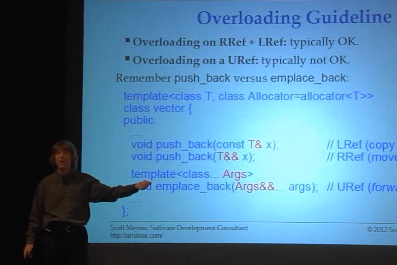C++ Rvalue References Explained--Thomas Becker
What are rvalue references and move semantics, and how do they work again, exactly?
If you haven't read Thomas Becker's nice explanation (or even if you have), be sure to check it out:
C++ Rvalue References Explained
Thomas Becker
1. Introduction
2. Move Semantics
3. Rvalue References
4. Forcing Move Semantics
5. Is an Rvalue Reference an Rvalue?
6. Move Semantics and Compiler Optimizations
7. Perfect Forwarding: The Problem
8. Perfect Forwarding: The Solution
9. Rvalue References and Exceptions
10. The Case of the Implicit Move
11. Acknowledgments and Further Reading

 From the keyboard of Scott Meyers:
From the keyboard of Scott Meyers: